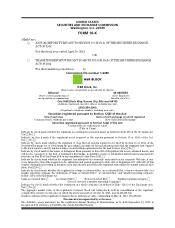HR Block 2012 Annual Report Download - page 20
Download and view the complete annual report
Please find page 20 of the 2012 HR Block annual report below. You can navigate through the pages in the report by either clicking on the pages listed below, or by using the keyword search tool below to find specific information within the annual report.requires the OCC to assess HRB Bank’s record in meeting the credit needs of the communities served by HRB
Bank, including low and moderate income neighborhoods. Under the CR Act, institutions are assigned a rating
of outstanding, satisfactory, needs to improve, or substantial non-compliance. HRB Bank received a
“satisfactory” rating in its most recent CR Act evaluation.
Bank Secrecy Act /Anti-Money Laundering Laws. HRB Bank is subject to the Bank Secrecy Act and other
anti-money laundering laws and regulations, including the USA PATRIOT Act of 2001. These laws and
regulations require HRB Bank to implement policies, procedures, and controls to detect, prevent, and report
money laundering and terrorist financing, and to verify the identity of their customers. Violations of these
requirements can result in substantial civil and criminal sanctions.
Qualified Thrift Lender Test. As a federal savings bank, HRB Bank is required to meet a Qualified Thrift
Lender (QTL) test. This test requires HRB Bank to have at least 65% of its portfolio assets in qualified thrift
investments on a monthly average for nine out of every 12 months on a rolling basis. As an alternative, HRB
Bank may maintain 60% of its assets in those assets specified in Section 7701(a)(19) of the Internal Revenue
Code. Under either test, HRB Bank is required to maintain a significant portion of its assets in residential
housing related loans and investments. Any institution that fails to meet the QTL test must, within one year,
either become a national bank or be subject to certain restrictions on its operations, unless it meets the test
within the year and thereafter remains a QTL. These restrictions include a prohibition against paying any
dividends, except with the prior approval of the OCC. Failure to meet the QTL test is a statutory violation
subject to enforcement action. As of April 30, 2012, HRB Bank met the QTL test.
Insurance of Accounts. The FDIC insures HRB Bank’s deposit accounts. The FDIC assesses deposit insurance
premiums on each FDIC-insured institution based on its capital, supervisory ratings, and other factors. As required
by the Dodd-Frank Act, the FDIC has adopted rules effective April 1, 2011, under which insurance premium
assessments are based on an institution’s total assets minus its tangible equity instead of its deposits.
Transactions with Affiliates. Transactions between HRB Bank and its affiliates are required to be on terms
at least as favorable to HRB Bank as transactions with non-affiliates, and certain covered transactions are
restricted to a percentage of HRB Bank’s capital.
Regulatory Capital Requirements.OCC regulations require HRB Bank to maintain specified minimum
levels of regulatory capital. To be well capitalized, a federal savings association must have a leverage ratio of at
least 5.0%, a Tier 1 risk-based capital ratio of at least 6.0% and a total risk-based capital ratio of at least 10.0%. To
be adequately capitalized, a federal savings association must have a leverage ratio of at least 4.0%, a Tier 1 risk-
based capital ratio of at least 4.0% and a total risk-based capital ratio of at least 8.0%. At March 31, 2012, HRB
Bank was well-capitalized, with a leverage ratio of 29.4%, a Tier 1 risk-based capital ratio of 119.0%, and a total
risk-based capital ratio of 120.3%.
On June 7, 2012, the OCC issued a notice of proposed rulemaking that would increase the capital
requirements for federal savings banks, including HRB Bank. See Item 1A, “Risk Factors,” for further
information on the OCC’s proposed capital requirements.
The OCC is authorized to take certain enforcement actions against federal savings banks that fail to meet the
minimum ratios for an adequately capitalized institution and to impose other restrictions on federal savings
banks that are less than adequately capitalized.
Limitations on Dividends and Other Capital Distributions. OCC regulations impose various restrictions on
federal savings banks with respect to their ability to make distributions of capital, which include dividends,
stock redemptions or repurchases and other transactions charged to the capital account.
Under OCC regulations, federal savings banks, such as HRB Bank, may generally make capital distributions
during any calendar year equal to earnings of the previous two calendar years, net of prior dividends, and
current year-to-date earnings. OCC regulations generally require that federal savings banks remain well-
capitalized before and after the proposed distribution. A federal savings bank proposing to make any capital
distribution greater than these limits must obtain OCC approval prior to making such distributions. Because of
the seasonal nature of our business and wide fluctuations in the level of HRB Bank’s assets, our Holding
Companies regularly make capital contributions HRB Bank, and HRB Bank regularly seeks regulatory approval
to repay such capital contributions as extraordinary dividends.
Federal Home Loan Bank System. HRB Bank is a member of the Federal Home Loan Bank of Des Moines
(FHLB), which serves as a reserve or central bank for its members and makes loans or advances to its
members. At April 30, 2012, HRB Bank had no outstanding advances from the FHLB.
Federal Reserve Regulation of SLHCs. Each of our Holding Companies is a savings and loan holding
company within the meaning of the HOLA. As such, they are registered as unitary savings and loan holding
6
H&R BLOCK 2012 Form 10K
























